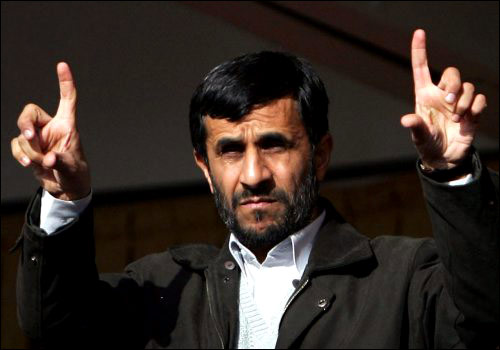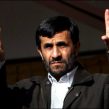
A New Rapprochement Between Moscow and Tehran
Publication: Eurasia Daily Monitor Volume: 8 Issue: 212
By:

The US reset policy has already become an object of political contention between Democrats and Republicans. The Obama Administration never ceases to point to it as a success, not least because of the progress that has occurred with Russia in regard to restraining Iranian proliferation, e.g., suspending the sale of S-300 surface-to-air missiles. But closer examination of recent Russo-Iranian relations indicates that in fact a rapprochement is taking place between Moscow and Tehran. There has been an intense schedule of high-level visits between the two capitals since August, and Iranian President Mahmoud Ahmadinejad insisted that the relations are those of friends based on neighborhood (IRNA, September 24).
Iranian Foreign Minister Ali Akbar Salehi also observed that Iran can be a reliable friend to Russia and the two sides share common views on different issues (FARS News, October 16). In August, the Russian Foreign Minister Sergei Lavrov had stated earlier that bilateral relations “have great prospects” and discussed improving them (Rossiya 24, August 17). Lavrov’s spokesman, Alexander Lukashevich, called Iran “our long-time, good and, friendly neighbor with whom we have been developing and will be developing multifaceted cooperation” and said that the relations are deepening intensively (Rossiya 24, October 5).
As signs of this improved relationship Iran is actively holding talks with Russia to build new nuclear reactors after the opening of the reactor at Bushehr (RIA Novosti, October 22). And there is no doubt that Tehran welcomes Moscow’s new “step-by-step” proposal to put to rest IAEA questions about Iran’s nuclear program and prevent further UN sanctions (FARS News, October 9). Indeed, Russian Deputy Foreign Minister Sergei Ryabkov said that “it is my profound conviction that the route of sanctions is futile” (Rossiyskaya Gazeta, October 3).
Russian energy, zinc, and aluminum companies are all planning to risk violating US sanctions by cooperating with Iran and Prime Minister Vladimir Putin’s spokesman, Dmitry Peskov, openly said that unilateral US sanctions are not binding under international law and many other countries also have ties with Iran (The Moscow Times, September 23). Indeed, India is paying for its Iranian oil through a bank in Russia as a way of making an end run around UN and US sanctions (Arab Times Online, October 29). Even Russian shipbuilding firms are seeking to do business with Iran regarding transport and production vessels for Iran’s development of offshore oil in the Caspian Sea (Kommersant, October 20).
Although Lavrov says UN sanctions should be implemented, he rejects unilateral US sanctions as unjustified and hurtful to the international community, as well as to Iran (Ekho Moskvy, October 21). Indeed, Russia is delivering radar jammers to Iran and negotiating future deliveries to it that do not contravene the exceptions carved out for Russia by the Obama Administration in the UN sanctions of 2010 (Agence France-Presse, October 25).
In fact, Russia’s arms sales agency, Rosoboroneksport, still holds out the possibility of selling non-sanctioned weapons to Iran (Interfax-AVN, February 3). Russia’s arms sellers openly state that they still plan to continue arms sales to Iran within the framework of the UN sanctions (Interfax-AVN, September 15). Indeed, Russian press reports in 2009 actually alleged the existence of a long-term high-level Russian program that fell apart in 2008 to smuggle weapons clandestinely into Iran using the Algerian and Syrian governments, Kurdish terrorists, and members of Russian organized crime in Spain (www.forum.msk.ru, November 9, 2009). Moscow now also objects to the publication of a new UN report on Iran, which describes Iranian violations of UN sanctions and resolutions against it (www.gsn.nti.org, May 13, 2011). And Russia and China both pressured the IAEA to soften or not even issue its eagerly awaited report detailing Iran’s efforts to develop nuclear weapons (Agence France-Presse, October 26).
Moscow’s policies strongly suggest that if there was a true cooperative and partnership relationship with the Obama Administration regarding Iran, then it has evidently reached the end of the road. The revolutions in Syria, Libya, Egypt and Tunisia, and in particular the NATO action in Libya and condemnation of Syria have brought both Moscow and Tehran together in an attempt to fashion a common line against the US and NATO here. Thus, Lavrov has stated that “We will not let Syria become a second Libya” (www.rt.com, November 1). And from the foregoing it is also clear that the powerful energy, nuclear and other lobbies have prevailed in seeking to ensure that they can continue doing business with Iran despite a plethora of UN and other sanctions being imposed upon it. Moreover, it is equally obvious that Russian policy on Iran continues to consist of hunting with the hounds and running with the hare. But it is difficult to see what benefit the US receives from this Russian policy. Indeed, these Russian actions amount to a very strange kind of partnership with the US in regard to Iran and forces Washington to wonder how Russian policy towards Iran might be different if there was no reset policy or claims of partnership with the United States.




